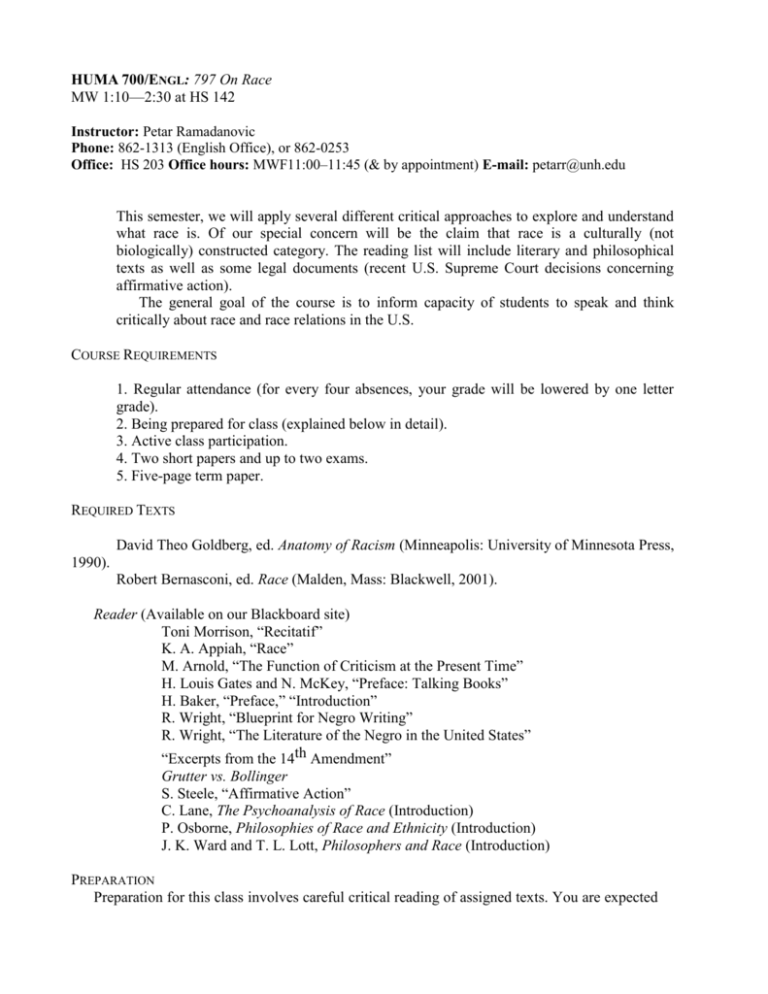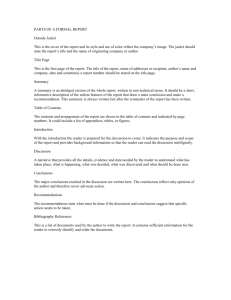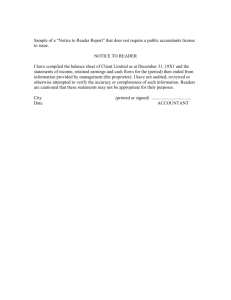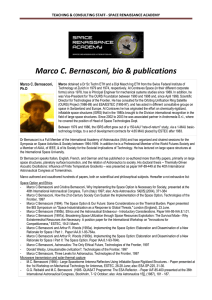Humanities 700
advertisement

HUMA 700/ENGL: 797 On Race MW 1:10—2:30 at HS 142 Instructor: Petar Ramadanovic Phone: 862-1313 (English Office), or 862-0253 Office: HS 203 Office hours: MWF11:00–11:45 (& by appointment) E-mail: petarr@unh.edu This semester, we will apply several different critical approaches to explore and understand what race is. Of our special concern will be the claim that race is a culturally (not biologically) constructed category. The reading list will include literary and philosophical texts as well as some legal documents (recent U.S. Supreme Court decisions concerning affirmative action). The general goal of the course is to inform capacity of students to speak and think critically about race and race relations in the U.S. COURSE REQUIREMENTS 1. Regular attendance (for every four absences, your grade will be lowered by one letter grade). 2. Being prepared for class (explained below in detail). 3. Active class participation. 4. Two short papers and up to two exams. 5. Five-page term paper. REQUIRED TEXTS David Theo Goldberg, ed. Anatomy of Racism (Minneapolis: University of Minnesota Press, 1990). Robert Bernasconi, ed. Race (Malden, Mass: Blackwell, 2001). Reader (Available on our Blackboard site) Toni Morrison, “Recitatif” K. A. Appiah, “Race” M. Arnold, “The Function of Criticism at the Present Time” H. Louis Gates and N. McKey, “Preface: Talking Books” H. Baker, “Preface,” “Introduction” R. Wright, “Blueprint for Negro Writing” R. Wright, “The Literature of the Negro in the United States” “Excerpts from the 14th Amendment” Grutter vs. Bollinger S. Steele, “Affirmative Action” C. Lane, The Psychoanalysis of Race (Introduction) P. Osborne, Philosophies of Race and Ethnicity (Introduction) J. K. Ward and T. L. Lott, Philosophers and Race (Introduction) PREPARATION Preparation for this class involves careful critical reading of assigned texts. You are expected to read each text at least two times (all texts are short and you must do this), underlining important parts, and making comments in the margins. Take extensive notes as you read. Without them you will not be able to write your papers or participate in class discussion. These notes usually range from copying the most significant sentences or passages to writing out critical comments or questions. This kind of active reading not only enhances your understanding of the text, but also makes it easier for you to retain the knowledge you have acquired. The main procedure we will follow in this course is a close reading, which has an analytic goal: to open the problem to understanding. It is essential for in-class discussion that you know the text in detail, even if you do not fully grasp its meaning. We will work on the more contentious parts together, in class. Do not hesitate to bring up the difficulties you have with understanding a text. Working through these difficulties is, in fact, the only way into a text. READING Reading in our class will usually proceed through the following three stages: 1) establishing what the work says and identifying its most significant ideas, 2) discovering contentious parts of the text – e.g., assertions that can be interpreted in different ways, claims that contradict each other, etc., 3) connecting the text to other relevant works. Again, do not hesitate to bring up the difficulties you have understanding the text. Working through these difficulties is most frequently the only way into a text. PAPERS Papers are to be typed, double-spaced, in Times 12 font, with a one-inch margin on all sides (top, bottom, right and left). The format should follow Hacker’s Rules for Writers or the MLA Style Manual. The short papers are designed to prepare you for the writing of the term paper. Give a summary of the article’s argument. Tell us how the argument is organized and why. Identify the article’s major examples and explain how the author uses them. Write your response as if you had to explain the article to a colleague who has not read it and give only essential information. Each response should identify the work you are writing about in the title. Because this is not an analytical paper but only a response, these short papers do not need to have a thesis. One to two pages, double-spaced, using Times 12 font, 300 to 600 words. (Please turn in your short responses a week after the assigned reading is due. If the assigned reading date is not clear, you can turn in your short paper by the end of the week following our discussion of that essay. The important thing is that you keep up with the readings and that you turn in all of your short responses as soon as possible.) You are responsible for a total of 2 (two) short responses on theoretical essays we read. One of the papers should be on a work we cover in the first part of the course, before October 15th, and one on a work in the second part of the course. The term paper is your most important written assignment in this course. You have two options. First option: Choose one or two terms, and up to three texts we have covered in class and write about them, connecting (e.g., comparing and contrasting) more than one author from the syllabus. For example, you could write on the difference between Kant’s and Fanon’s understanding of race; on the status of race in literary or cultural studies; or on Affirmative Action; etc. Second option: Alternatively, you can do a reading of any one text we cover in class. For example, you can analyze Wright’s “Blueprint” by doing a close reading of it, or you could focus on one of the major themes in this work, for example, the notion of “Negro writing.” Unlike the short papers, the final paper requires an appropriate frame, which should be provided by an introduction and a conclusion. When grading, I am looking for precision in expression, analytic depth of the paper, and creativity of insights. The term paper is due ??? Be sure to submit your papers on time. Ask a colleague attending this course to critique your paper. Consider that critique carefully before finishing the final version. Read my comments on your papers twice – once when you receive the paper back and once just before you start writing your next paper. GRADE The grade will depend on class preparation and class participation (25%), short papers and exams (40%), and the term paper (35%). The minimum that is required from you to complete this course successfully is: to come to class on time, to attend the class regularly, to be prepared for and participate in class discussions, to write your papers, and to submit your work on time. For my part, I will try to help you achieve what you have set out to do and will do my best in working with you on fulfilling the aims of this course. SCHEDULE I INTRODUCTION Why race? II DISCOVERING RACE – Is there such a thing? Toni Morrison, “Recitatif” (Reader) III WHAT IS RACE? What is racism? What is the difference between race and racism? Working definitions. K. A. Appiah, “Race” (Reader) K. A. Appiah, “Racisms” (Goldberg) IV WRITING ACADEMIC PAPERS – one session if there is a need. V HISTORY OF THE TERM RACE Immanuel Kant, “On the Use of Teleological Principles in Philosophy” (Bernasconi) R. Bernasconi, “Who Invented the Concept of Race? Kant’s Role in the Enlightenment Construction of Race” (Bernasconi) W. E. B. Du Bois, “The Conservation of Races”(Bernasconi) Tommy Lott, “Du Bois’s Anthropological Notion of Race”(Bernasconi) Frantz Fanon, “The Fact of Blackness”(Goldberg) VI LITERARY STUDIES AND RACE M. Arnold, “The Function of Criticism at the Present Time” (Reader) H. Louis Gates and N. McKey, “Preface: Talking Books” (Reader) H. Baker, “Preface,” “Introduction”(Reader) R. Wright, “Blueprint for Negro Writing” (Reader) R. Wright, “The Literature of the Negro in the United States” (Reader) Some examples of African American literature -- presentations – Olaudah Equiano, Chapter One from “The Interesting Narrative of the Life of Olaudah Equiano” (Reader) Phillis Wheatley, “On Being Brought from Africa to America,” “To the King’s Most Excellent Majesty,” “To the Right Honorable William, Earl of Dartmouth” (Reader) Gil Scott-Heron, “The Revolution Will Not Be Televised” (Reader) Grandmaster Flash and the Furious Five, “The Message” (Reader) Public Enemy, “Don’t Believe the Hype” (Reader) Queen Latifah, “The Evil That Men Do” (Reader) VII REVIEW AND EXAM VIII CULTURAL STUDIES AND RACE Roland Barthes, “Bichon and the Blacks”(Goldberg) Roland Barthes, “African Grammar”(Goldberg) Paul Gilroy, “One Nation under a Groove: The Cultural Politics of ‘Race’ and Racism in Britain” (Goldberg) Barbara Christian, “What Celie Knows That You Should Know” (Goldberg) IX A RECENT DIALOGUE ON RACE Robert Gooding-Williams, “Race, Multiculturalism and Democracy”(Bernasconi) Judith Butler, “Conversational Break” (Bernasconi) X A RECENT MONOLOGUE ON RACE Anna Deavere Smith: Fires in the Mirror (video recording, Library has a copy. Arrange to watch in outside of class.) XI AFFIRMATIVE ACTION “Excerpt from the 14th Amendment”(Reader) Grutter vs. Bollinger (Reader) S. Steele, “Affirmative Action” (Reader) L. Chen Einsiedler and T. DeMitchell, “Affirmative Action and the Model Minority in Higher Education Admissions: A Conundrum for Asian Americans” (Reader) XII APPROACHES -- closing arguments about race C. Lane, The Psychoanalysis of Race R. Bernasconi, Race P. Osborne, Philosophies of Race and Ethnicity J. K. Ward and T. L. Lott, Philosophers and Race






